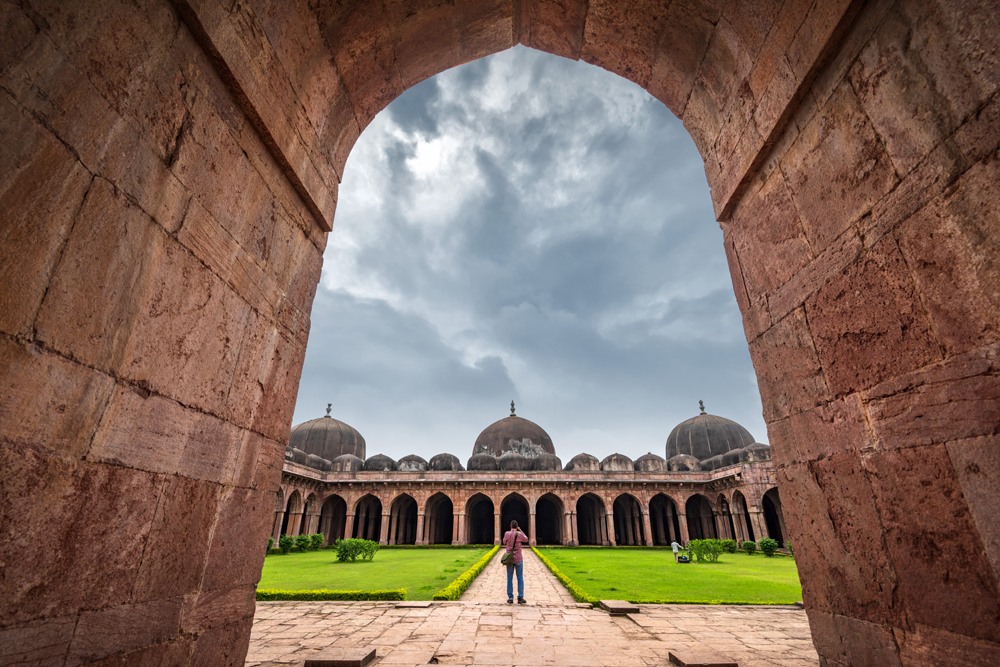Even after 500 years, the timeless saga of love between Sultan Baz Bahadur of Malwa and his beloved Rani Roopmati lives on
The swirling, billowing clouds on high looked down benignly as we spilled out of the bus in a buzz of excited chatter and laughter. It seemed as though it might rain any minute. Happily that didn’t happen though. Instead we were greeted with a soft, almost imperceptible spray of mizzle that softly wrapped us all in its gentle and misty embrace. Perhaps I ought to tell you that a ‘mizzle’ is a gentler and milder version of a drizzle. In all probability, an ingenious combination of the words ‘mist’ and ‘drizzle’ (mi+zzle), which gives us ‘mizzle.
On a typical day in Salalah, Oman, during the enchanting Khareef season, what tourists and locals are most likely to experience as they move about in the open is a ‘mizzle’, a sort of a friendly, loving caress that nourishes the land and transforms it into a verdant and magical paradise.
We had just made a two-hour, 100-km journey from Mhow, a quiet and non-descript cantonment town in the state of Madhya Pradesh, which literally means ‘central India’. In the old days of British rule, the place was known as the ‘military headquarters of war’. Its abbreviation ‘MHOW’, soon became an accepted acronym and ultimately the name of the place. It is home to a very important army establishment, The College of Combat, Mhow.
I suppose the next obvious question that pops up is what was a group of 21 journalists from all over India, culled from among the best newspaper of India, doing in Mhow? And more precisely now on an excursion in Mandu. Our contingent of journalists were on a six-week War Correspondents’ Course, sponsored by the Government of India’s Ministry of Defence. The general idea was to ingrain in us a better perspective on how to report on defence matters and perhaps in a war use our training to report from the front. That opportunity never came my way. But I did give me the most wonderful opportunity to travel all around the country, writing intimate stories about the thrills and perils of the armed forces in various scenarios and situations. Our six weeks of training was equally divided among the Army (Mhow), Air Force (Jodhpur) and the Navy (Cochin).
Mandu, located in Dhar district of Madhya Pradesh, forms the western edge of the Malwa plateau, and has an elevation of 1,500 feet (approx.). It is flanked along its southern boundary by the Narmada-Son Valley. To the east of Dhar district lie the districts of Indore and Ujjain.
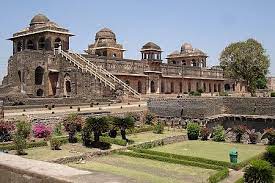
Poets, writers, bards, and star-crossed lovers down the ages have written tomes about Love, particularly about the dilemmas they’ve had to face in trying to decide whether to accept love, whatever the consequences, or to reject it and pine away in misery. A poem that sums it up brilliantly in just 8 lines is one written by a 16 century Queen of central India, Rani Roopmati, a Hindu princess of Malwa, which is now in present-day Mandu or Mandavgad. About 100 kms away from Indore. Mandu is an ancient city celebrated for its architecture.
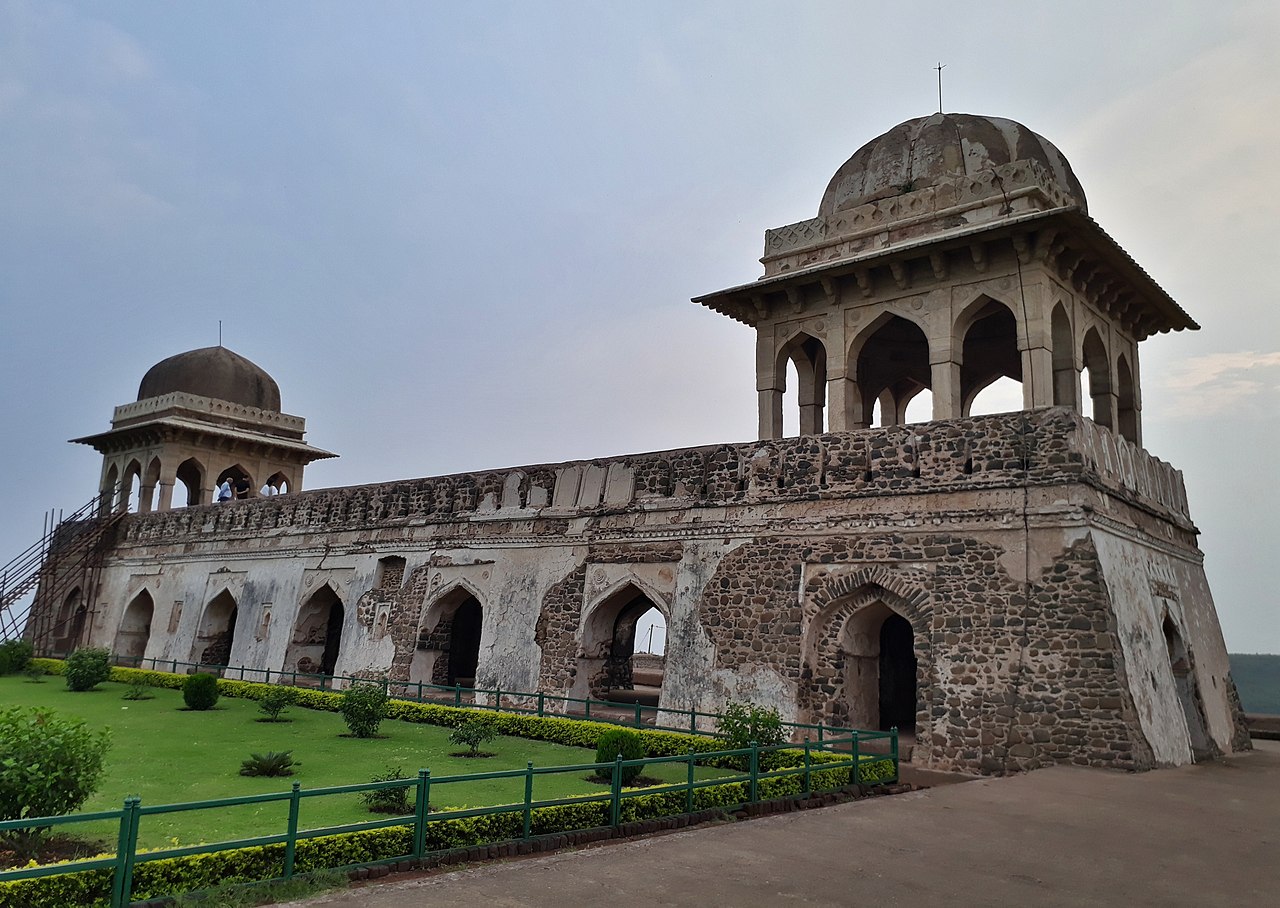
Beauty with the voice of a nightingale
A collection of her poems were translated into Persian by Ahmadul Umri Turkoman in 1599. This collection of poems changed hands several times. It finally came into the possession of CE Luard, an Englishman. From here it passed on to another English gentleman, LM Crump. His translation from Persian into English appeared in 1926 under the title: “The Lady of the Lotus: Rupmati, Queen of Mandu – A strange tale of faithfulness”.
Here is that poem:
They who are wise
Avoid Love’s lure,
Yet tempted once
There is no cure,
Save to press on
With banners high,
Resolved to win
Or fighting die
Baz bahadur’s encounter with Roopmati
*Sultan Baz Bahadur, was a keen lover of music and passionately fond of singing himself. It was only natural that he should spend a great deal of his time trying to know and learn more about this soulful art, from his teacher, a court musician and singer.
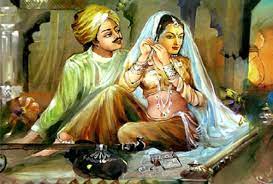
Out hunting deer in the nearby woods one day, Baz Bahadur was suddenly distracted by the melodious voice of a maiden, singing somewhere far away in the distance. It happened just as the Sultan was about to release his arrow at a deer. The haunting voice mesmerised him. So enamoured was he that he forgot all about the hunt, and decided to follow the sound and find the person behind this incredibly beautiful voice.
Baz Bahadur soon came upon Roopmati in a clearing. She along with her hand-maidens were bathing in a nearby stream. As he drew closer, the Sultan was immediately struck by the dazzling beauty of the singer; it was a kind of beauty he had never ever beheld in his life.
Smitten beyond belief by Roopmati’s beauty and her incredibly beautiful voice, Baz Bahadur requested the comely and graceful maiden to accompany him back to his palace. It was his fervent wish and desire to always have her within his presence so that he could always hear her singing. To be able to sing along with her from time to time, would be the ultimate fulfillment of his love for her. By now, both Roopmati and Baz Bahadur were convinced that their’s was a true love pre-ordained by the stars.
However, Roopmati told the Sultan she was bound to stay where she was because of a vow given by her father Raja Dhan Singh to the Narmada River. Legend has it that once when a swollen Narmada threatened to inundate and completely wipe out his kingdom (Dharmagiri), the Raja made a promise that he would gift his first-born child to the river if she would spare his kingdom. Accordingly, the King kept his word and placed the new-born Roopmati in the lap of the River Narmada. Exceedingly pleased, the River Goddess granted the King a boon: “As long as Roopmati pays obeisance to me before having her first meal of the day, your kingdom will be blessed with prosperity and will never have to face the wrath of my waters inundating your lands”.
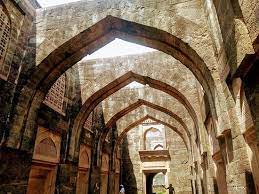
To ensure that Roopmati never had to break her promise, Baz Bahadur had a pavilion built for her on top a hill, at a height of 365 metres. The view from here was breath-taking and one could see in any direction up to a distance of 24 kilometres. But more importantly, it made it possible for Roopmati to pay her daily ritual obeisance to the River Goddess.**
Akbar’s overtures to Roopmati
In time, Baz Bahadur and Roopmati exchanged vows of marriage, which was solemnised according to Muslim and Hindu rites. Unfortunately, their love story had a short life span of just six-seven years, from 1555-1562.
It didn’t take long for word about Rani Roopmati’s beauty and her extraordinary singing to reach the ears of the Mughal Emperor Akbar at his court in Delhi. He immediately sent an urgent message to Baz Bahadur to present Roopmati in his court and that he would brook no delay in the matter. Proud and unbending, Baz Bahadur wrote back saying it would be better if the Emperor would send all the wives in his harem to his court in Malwa.
Stung to the quick by this impudent reply, Akbar sent the full might of the Mughal army under the leadership of his general Adham Khan to annex the kingdom of Malwa and bring back Roopmati by force. Baz Bahadur’s army was no match for the mighty Mughal army and was put to rout; Baz Bahadur fled for his life from the battlefield. Roopmati, unwilling to fall into the hands of the Mughal conqueror, chose an honourable death by poisoning herself, bringing to an untimely end a beautiful love story.
The present-day complex of ancient structures, which still stands in a well-preserved state, comprises the palace of Sultan Baz Bahadur. The pavilion of Roopmati, the Jahaz Mahal, which is built in an ingenious manner and gives an impression of it being a barge floating on the water, the Hindola Mahal and a couple of other interesting structures together make up a large, sprawling complex spread over several hectares of land.
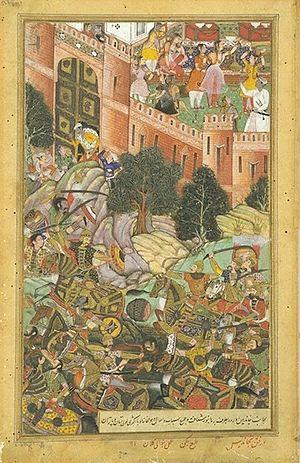
But a love such as this never dies. Today every stone or piece of mortar, or some crumbling edifice somewhere echoes the songs and the love stories of Rani Roopmati and Baz Bahadur. People who live in the vicinity of the Mandu complex say that sometimes in the stillness of a summer morning or in the silvery silence of a moonlit night, you can hear the faint strains of singing coming from the direction of Roopmati’s pavilion. In an instant it fades away. You wonder if that was real or was just the whispering wind, trying to tell you a secret.
It is almost dusk and in the fading light we make our way back to our waiting bus to take us back to our barracks in Mhow. As we safely clamber aboard, pouring, blinding rain comes crashing down, with blinding flashes of lightning and thunder. It seemed like a befitting finale to a memorable and unforgettable journey.

